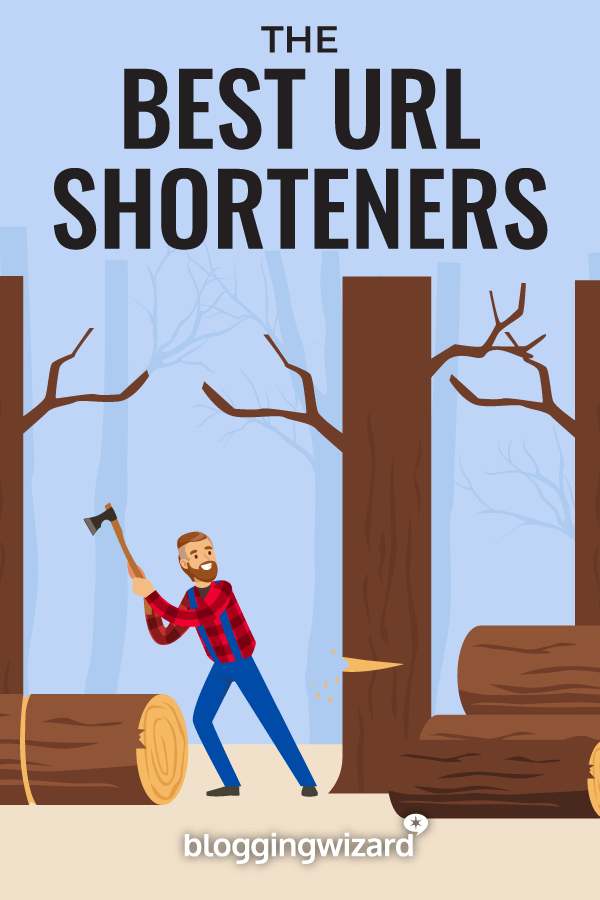10 Best URL Shorteners For 2024: Google URL Shortener Alternatives

Have you ever tried to share a link to your latest blog post and realized it was long, and ugly, and exceeded the Twitter character count?
Me too. And I’ll tell you, nobody wants to click on a link like that even if it does fit the character count.
The truth is, shorter URLs are always better. They’re nicer to look at, provide a better user experience for customers and social media followers, and are super simple to get. You just have to know how.
That’s why today we’re going to share with you the top URL shorteners around, so you can pick the one that best suits your link sharing needs.
The best URL shorteners compared
1. Sniply.io
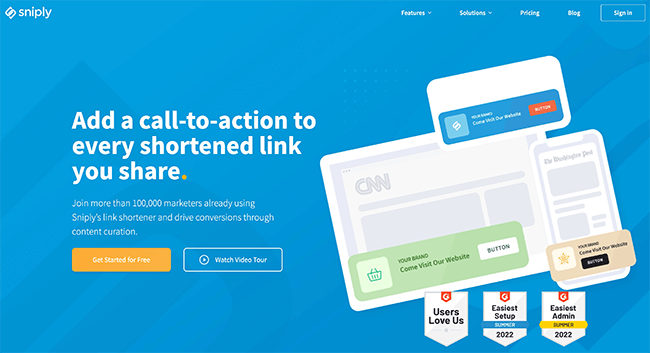
Sniply.io is a link shortener with a difference. Not only does it create customizable links for your brand, but you can also design CTA blocks and add them to your website, blog posts and social media.
When creating your shortened links you have a variety of customization options. You can tailor the design such as color and text, add buttons and images as well as create forms.
Unsure which will convert best? Sniply has got you covered. You can optimize your conversions by running A/B tests and managing the data via the Analytics tab. Here you can monitor clicks, conversions, average pages per visits and more. You can also filter the data by brand, campaigns and timeframes.
Another useful feature is its own browser extensions for Google Chrome, Firefox and other browsers. Wherever you are on the internet, may it be reading a great article that your audience will find useful or in a social media marketing tool such as Buffer or Sprout Social; you can launch the extension, enter the URL, customize your CTA and generate your link very easily.
Price: Free plan with limited features. Paid plans from $9/month, annual discounts available.
2. JotURL
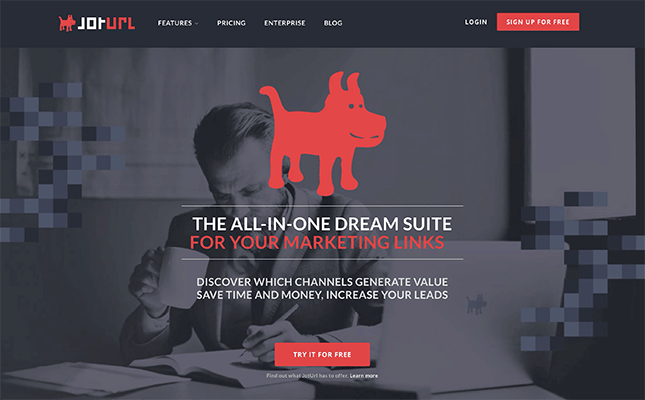
JotURL is much more than a URL shortening tool, it’s a cost effective, featured packed marketing tool for businesses who want to optimize their marketing campaign links to drive leads and increase revenue.
JotURL boasts over 100 features which aims to help you optimize every interaction with your audience by monitoring and tracking your links to make sure they’re performing at their best.
By using branded links you’re providing a consistent and trustworthy experience for your audience. With their Social Opt-in CTA feature you can enhance these branded links with a branded call-to-action message which you can then share on social media.
Every link has 24/7 monitoring to ensure they’re safe and available, so you never have to worry about a broken link. In addition, they also have 24/7 click-fraud monitoring to filter out bot clicks so you can blacklist these sources or IP addresses.
View all your analytics in one simple dashboard. Sort and filter through your data via keywords, channels, sources etc to help you understand how your links are performing.
And, you can use their InstaURL feature to create mobile optimized social media landing pages. These work great, especially on Instagram.
Price: Plans start from €9/month and there’s a discount available for yearly plans.
3. Bitly
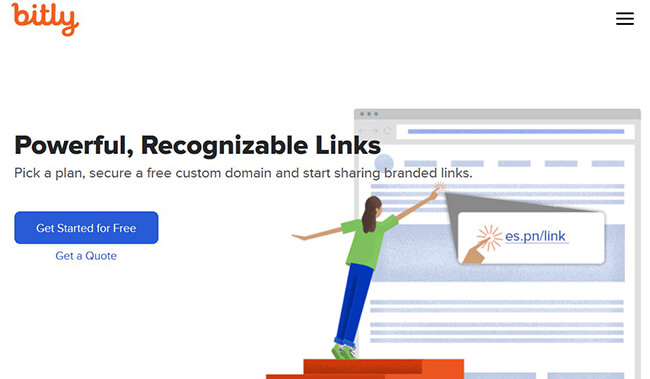
Bitly is one of the most popular URL shorteners around. And one of the reasons for this is because it doesn’t require an account to use. Plus, you can create as many short links as you want.
With Bitly, you can monitor link clicks, click locations, and even top referrers. This is great for fine-tuning your campaign efforts and sharing your content where it’s most likely to be seen and interacted with. And if you want to streamline your marketing efforts further, you can integrate Bitly with Zapier and automate other tools that support Zapier.
Each link you create with Bitly is encrypted with HTTPS to safeguard against third-party tampering. In other words, your target audience will never have to worry that your short links have been hijacked and will lead them elsewhere.
And if you want to, you can create QR codes, utilize mobile deep links to drive the right people to the right content at the right time, and replace the ‘bit.ly’ portion with your very own brand.
Price: Free to use without an account. To make creating and managing links easier, create a free account. If you need a custom domain and more branded links, the premium plans start at $35/month. Lowest plan requires a yearly subscription.
4. TinyURL
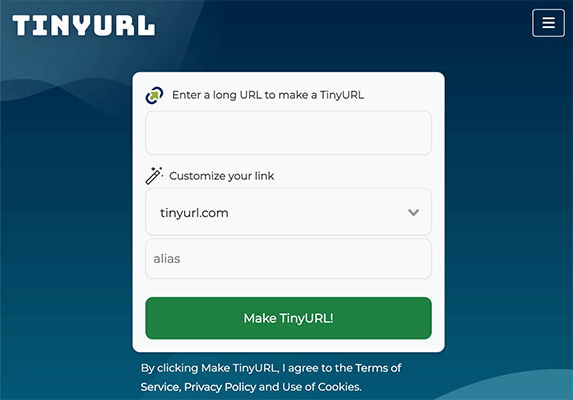
TinyURL is a simply and easy to use URL shortener.
To start, just enter the URL you want to shorten and voila, it’s now tiny for you. And to make things even easier (though I’m not sure that’s even possible!), you can add TinyURL to any browser for easy access and faster link shortening.
Your shortened links never expire, so you never have to worry about broken links in the future. In other words, your content will be available to users forever.
Paid plans offer more features such as monitoring and analytics for up to 2 years. From the dashboard you can view the areas of the world the clicks are coming from, as well as dates, times and from different types of devices.
And if you’re worried about branding, don’t be. There’s a branding and customization feature that lets you change the front-half of your shortened URLs, as well as add your own domain or subdomain.
Price: Free. Paid plans start at $12.99/month. Yearly discounts available.
5. Rebrandly
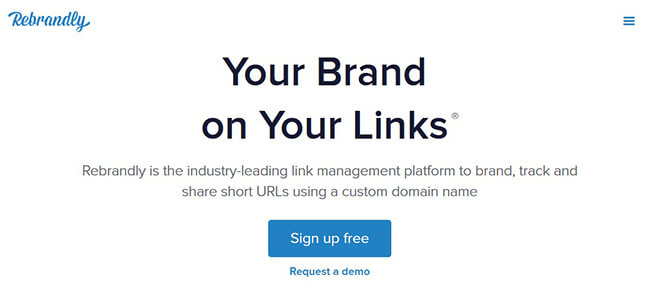
Rebrandly is the type of URL shortener that’s perfect for customizing and branding URLs to establish a recognizable business in the digital sea of competition.
It starts by helping you set up your site’s domain name so you can use it with every shortened link you create. But more than that, it comes with features such as:
- Link Management – Create fast redirects, QR codes, link expirations, and custom URL slugs for the ultimate user experience. Plus, you can bulk create links to save time.
- Traffic Routing – Enjoy link retargeting, links with emojis, 301 SEO redirects, and mobile deep linking so the right people access your links.
- Analytics – Utilize the UTM builder, enjoy GDPR privacy, create custom reports for improving campaigns, and even add your business logo to reports to show clients the power you have to help them build their business and expand their audience reach.
- Domain Name Management – Add multiple domain names, encrypt links with HTTPS, and define a main domain redirect.
- Collaboration – Include your team in the link shortening fun, enable two-factor authentication, track activity logs, and define user access.
Price: There’s a limited free plan and premium plans start at $14/month, annual discounts available.
6. BL.INK
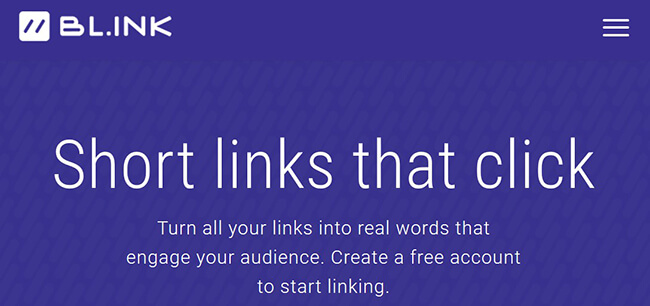
BL.INK is a full-featured URL shortener tool that comes with a beginner-friendly dashboard for tracking link activity.
For example, you can check traffic based on geographic location, device type, language, and even referrer to better pinpoint where your target audience is and how they’re accessing your content. Plus, you can find out the time of day your clicks see the most engagement.
With BL.INK you can also create custom short links for better branding and even test the beta version of Smart Link to create highly targeted word-based URLs that will drive traffic to your site and encourage people to convert. And to make sure the right team members access your link shortener tool, easily enable user permissions.
Price: BL.INK offers tiered plans, so you only pay for what you use. Premium plans start at $48/month.
7. T2M
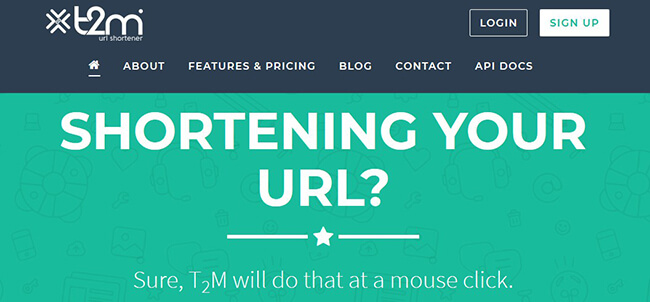
T2M is another full-service link shortener that comes with a packed dashboard full of statistics and link activity for you to analyze. Plus, you can create custom branded links that never expire, bulk create links to save time and effort, and share links to social media with one single click.
Other great features of T2M include:
- Target geographic locations with your links
- Password protect URLs
- Unlimited link creation and tracking stats
- No advertisements or spam allowed
- Easy to use dashboard with search functionality for easy link management
- Free Let’s Encrypt SSL certificate
- 404 redirects
- Built-in GDPR privacy
- CVS import and export tool
Price: The basic plan requires a $5 startup fee and then will be free forever with monthly link creation and tracking limits. Premium plans start at $9.99/month for access to advanced features.
8. Tiny.cc
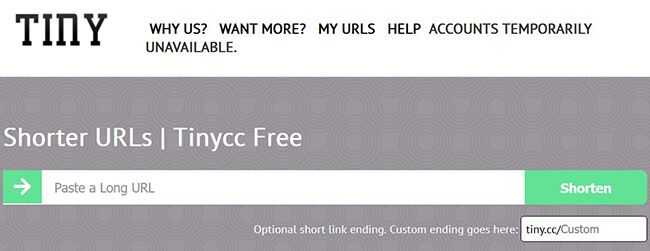
Tiny.cc is a very basic, though highly effective URL shortener that lets you create custom URL endings for branding purposes.
You don’t need an account to access the link tracking stats, which include metrics based on returning clicks, location or origin, browsers used, unique visitors, and much more. You can easily edit or delete any URL you want, view your entire link history, and use the manage, filter, tag, and search functions to find the URLs you need.
In addition, with Tiny.cc, you can:
- Bookmark the tool for easier access
- Create links for SMS messages, email campaigns, social media, advertisements, and more
- Use links in QR codes and track statistics
- Access any custom URL slug you want
Price: The free plan comes with 500 short URLs, the ability to edit links, and tags for organizing links. Premium plans start at $5/month and come with features like a custom domain, multiple users, more links and clicks, and geolocation reporting.
9. Polr
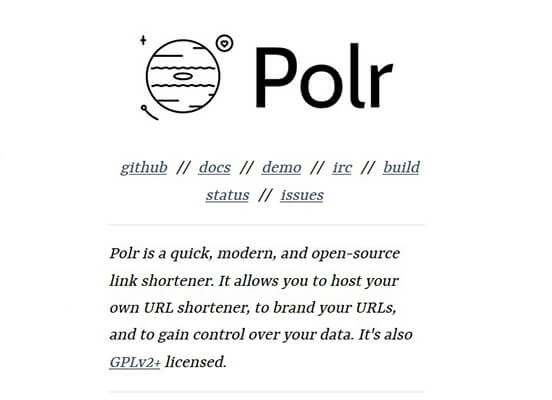
Polr is an open-source project for those that want to create and host their own URL shortener. Keep in mind, however, this will most likely only work for those that have technical knowledge about things like PHP, Lumen, and MySQL.
This link shortening tool comes with a slick and modern interface, limited incoming traffic tools for analyzing link activity, and custom domain name branding for establishing your business amongst your target audience.
Something that many URL shorteners don’t provide is a neat demo page, so you can check out the tool before committing to it. And if you want to make management of your short links a cinch, all you have to do is create an account.
Price: FREE
10. Yourls
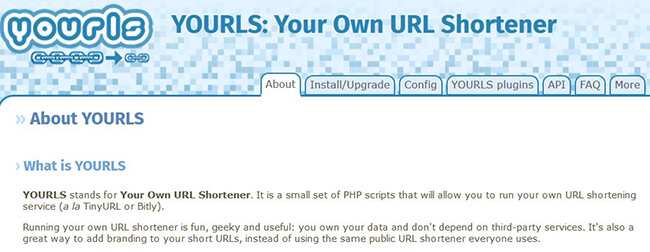
Yourls, which stands for ‘your own URL shortener,’ is another open-source and self-hosted link shortener, much like Polr. That said, to use this tool, you’ll need to install and run it on your own server, making it much different than the other URL shorteners on this list.
Some of Yourls’ best features include:
- Create private and public links
- Statistics such as click reports, referrers, and geolocation
- Sequential or custom created links
- Sample files for creating your own public interface
- Additional features accessed via plugins
- Bookmarklets for shortening and sharing with ease
Though you install and run this URL shortener yourself, it was built to be lightweight and non-bloated so it’s never a strain on your server’s resources.
Price: FREE
Why shorten URL’s?
There are many reasons why everyone should use a URL shortener when sharing a link back to their website:
- A good URL shortener will turn your excessively long and confusing looking URL (full of jumbled letters and numbers) into a nice and tidy link that’s easy to click on.
- You can create custom branded URLs with the right link shortener.
- Shorter URLs are easier to read, type, and memorize.
- Users typically trust branded URLs over the long and possibly spam-filled URLs.
- You can track engagement with your links using a URL shortener and make improvements to your marketing campaigns.
As you can see, there’s more to shortening a long link using a URL shortener.
Choosing the best URL shortener for you
It’s important to remember that not all URL shorteners are the same.
For businesses, marketers, and content creators – Sniply is the best option.
For casual users who need a quick and easy link shortener solution, consider TinyURL.
And there you have it! The top URL shorteners available right now. And the best part is, no matter what your link shortening needs are, there’s a tool to satisfy it.
Whether you’re looking for a feature packed tool, a free URL shortener or an alternative to the Google URL shortener that’s no-longer available – you’ll find something here to fit your needs.
Disclosure: Our content is reader-supported. If you click on certain links we may make a commission.

